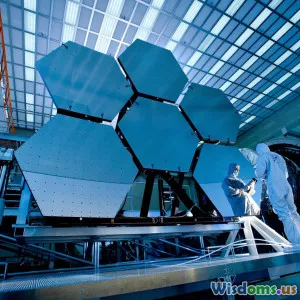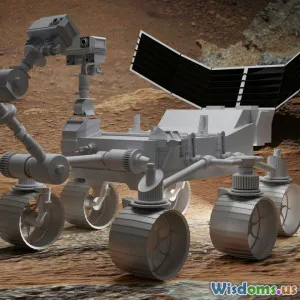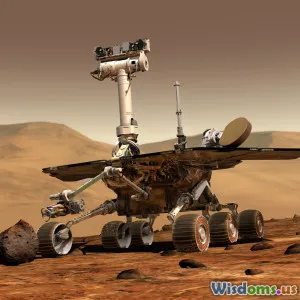
Future Jobs: Sci Fi Predictions
8 min read Explore the fascinating future of work through sci-fi predictions shaping tomorrow's job landscape. (0 Reviews)
Future Jobs: Sci-Fi Predictions Shaping Tomorrow's Workforce
From the pages of classic science fiction to blockbuster films and visionary thinkers, the future of work has long been a subject of intrigue and imagination. But what if those fictional futures are not that far from reality? As technology accelerates at an unprecedented rate, jobs once confined to sci-fi fantasies are poised to become tangible careers.
In this article, we explore some of the most compelling future job predictions informed by science fiction, grounded in current trends and expert insights. We uplift the imaginative visions of speculative fiction by showing how they reflect ongoing innovations, providing a window into the jobs of tomorrow.
The Nexus of Sci-Fi and Future Job Forecasts
Science fiction as a genre has always served as a sandbox for futuristic ideas, including the evolution of human labor. Writers like Isaac Asimov, Philip K. Dick, and Arthur C. Clarke envisioned worlds transformed by robotics, artificial intelligence, space colonization, and brain-machine interfaces. Their narratives didn’t just entertain; they inspired inventors and influenced technological research trajectories.
Today, with AI development, advancements in space tech, biotechnology, and immersive virtual realities, exactly what sci-fi envisioned is happening — defining new career possibilities.
As Arthur C. Clarke famously stated: "Any sufficiently advanced technology is indistinguishable from magic." Jobs emerging from such "magic" are coming into focus.
Emerging Sci-Fi Inspired Jobs
1. AI Companion Designer
Science fiction frequently explores artificial beings with personalities — from "Data" in Star Trek to "Samantha" in Her. These AI companions serve functions beyond automation; they are confidants, collaborators, and caretakers.
Real-World Connection: Companies like Replika are already creating AI chatbots that learn user preferences and provide mental wellness support. As AI becomes more emotionally intelligent, AI companion designers will specialize in crafting nuanced, ethical, and deeply personalized AI personalities for healthcare, eldercare, education, and entertainment sectors.
- Skill Set: Psychology, machine learning, behavioral science, ethics
- Projected Growth: The global AI market is expected to reach $190 billion by 2025 (Statista).
2. Space Miner
Mining asteroids or the Moon is a concept popularized widely in sci-fi, such as in The Expanse series. With Earth's resources finite, asteroid mining represents an extraterrestrial gold rush.
Current Status: NASA, private companies like Planetary Resources, and international partnerships are conducting feasibility studies for space resource extraction.
- Job Role: Oversee robot fleets extracting metals and minerals; process materials in zero gravity; maintain mining habitats
- Economic Impact: Space mining could generate trillions in rare minerals such as platinum and rare earth metals.
3. Neural Interface Architect
Mind-machine interfaces bridging thoughts and computers have featured since Neuromancer and Ghost in the Shell. Today, brain-computer interfaces (BCIs) like Neuralink promise direct neural data interaction.
Job Description: Designing secure, efficient, and user-friendly neural implants and software that adapt to human cognitive processes.
- Importance: Key for augmented cognition, medical prosthetics, and potentially, "mind upload" concepts.
- Challenges: Ethical concerns, privacy, cybersecurity
4. Virtual Habitat Designer
The sci-fi notion of fully immersive alternate realities, as seen in Ready Player One, is becoming something enabled by VR and the metaverse.
Profession Spotlight: Architects and narrative designers creating convincing digital environments for social, educational, and professional purposes.
- Future Development: Incorporates haptic feedback, multi-sensory stimuli, and adaptive AI to create experiences indistinguishable from reality.
5. Climate Reversal Specialist
Environmental restoration science is becoming crucial in sci-fi worlds ravaged by climate change or ecological collapse. Specialists in bioengineering ecosystems or weather modification are envisioned future heroes.
Role: Employ synthetic biology, geoengineering, and AI model simulations to repair damaged environments.
- Relevance: According to the UN, over 1 million species face extinction; this role becomes pivotal in combating biodiversity loss.
Bridging Fiction and Reality: Supporting Evidence
- NASA's Artemis program aims to land the first woman and next man on the Moon by 2025; mining missions are targeted soon after.
- AI companionship is being integrated into eldercare robots, such as ElliQ, enhancing seniors' mental health.
- Neuralink's ongoing trials in primates hint at potential for human BCI applications.
- Unity and Unreal Engine power immersive VR experiences, already used in education and therapy.
As these technologies mature, workforce demands will shift dramatically.
The Ethical and Societal Dimensions
While sci-fi often glorifies futuristic jobs, real-world deployment raises questions:
- AI Companions: How to ensure emotional authenticity without exploitation?
- Space Mining: Who governs and benefits from extraterrestrial resources?
- Neural Interfaces: How to protect cognitive privacy?
Preparing for these future jobs also requires discussion about regulations, education reform, and inclusivity to avoid exacerbating inequality.
Conclusion: Preparing for the Sci-Fi Future of Work
Fiction may inspire, but these futuristic jobs demand multidisciplinary cooperation spanning technology, ethics, sociology, and policy. Aspiring professionals should cultivate agility, lifelong learning, and foresight.
By understanding the trajectories science fiction has illuminated, we gain not only a glimpse into future professions but also a blueprint to responsibly shape that future. Embracing these roles may not only prepare workers for tomorrow but also help society navigate complex transformations ahead with creativity and conscience.
The future described in speculative stories is unfolding before our eyes — and the next generation stands at the threshold of unprecedented opportunity. Will you be ready?
References:
- Statista, “Artificial Intelligence (AI) Market Size Worldwide,” 2021
- NASA, Artemis Program Updates, 2023
- United Nations, “Global Biodiversity Outlook,” 2020
- Neuralink, Public Demonstrations, 2023
- Replika.ai, Company Overview, 2024
Rate the Post
User Reviews
Popular Posts





















